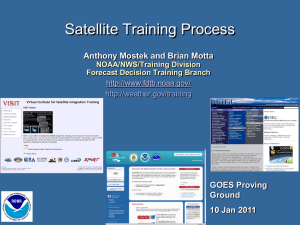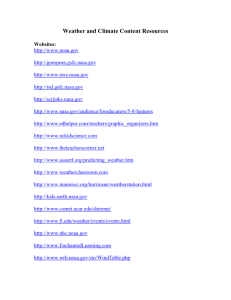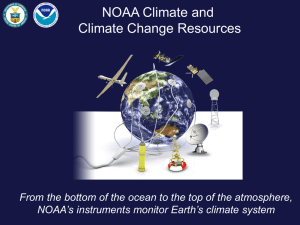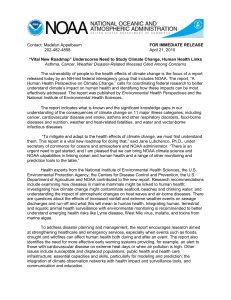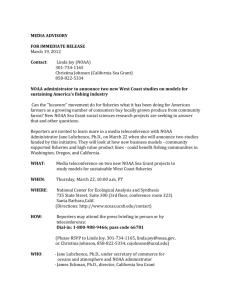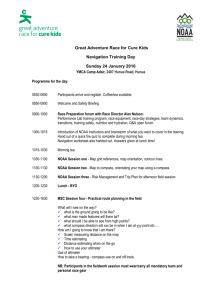Evaluation of 2010 ESIP Teacher Workshop ESIP teacher workshop
advertisement
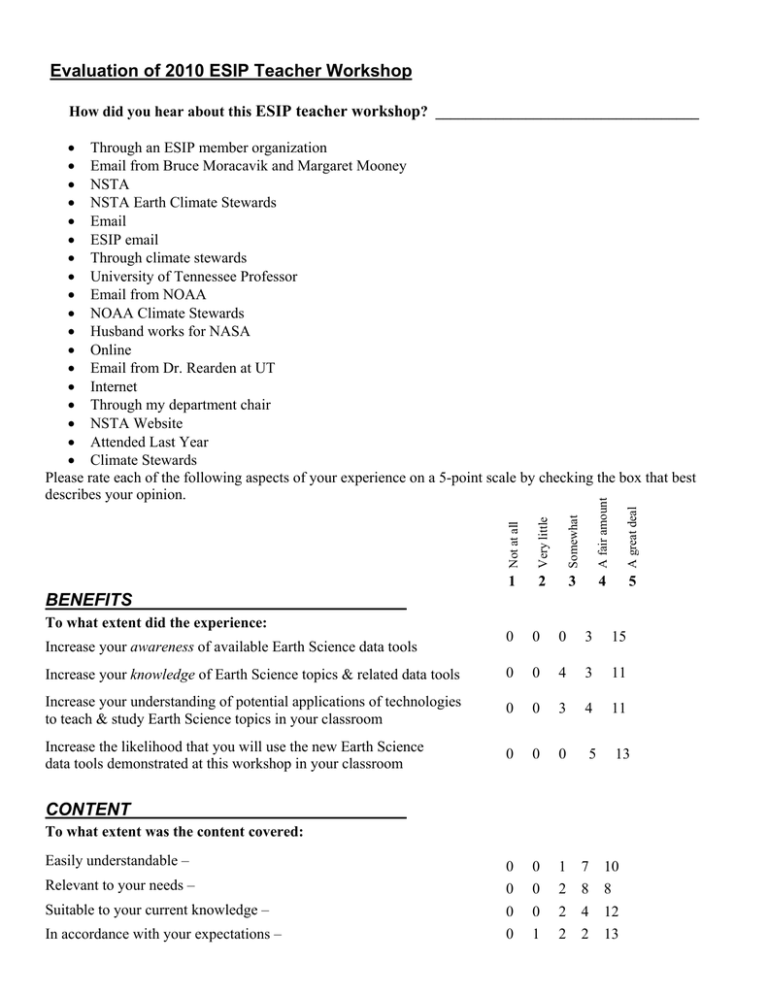
Evaluation of 2010 ESIP Teacher Workshop How did you hear about this ESIP teacher workshop? ___________________________________ Not at all Very little Somewhat A fair amount A great deal Through an ESIP member organization Email from Bruce Moracavik and Margaret Mooney NSTA NSTA Earth Climate Stewards Email ESIP email Through climate stewards University of Tennessee Professor Email from NOAA NOAA Climate Stewards Husband works for NASA Online Email from Dr. Rearden at UT Internet Through my department chair NSTA Website Attended Last Year Climate Stewards Please rate each of the following aspects of your experience on a 5-point scale by checking the box that best describes your opinion. 1 2 3 4 5 BENEFITS To what extent did the experience: 0 0 0 3 15 Increase your knowledge of Earth Science topics & related data tools 0 0 4 3 11 Increase your understanding of potential applications of technologies to teach & study Earth Science topics in your classroom 0 0 3 4 11 Increase the likelihood that you will use the new Earth Science data tools demonstrated at this workshop in your classroom 0 0 0 5 13 0 0 0 0 0 0 0 1 1 2 2 2 Increase your awareness of available Earth Science data tools CONTENT To what extent was the content covered: Easily understandable – Relevant to your needs – Suitable to your current knowledge – In accordance with your expectations – 7 8 4 2 10 8 12 13 DELIVERY To what extent was information: Well organized 0 0 1 5 12 Presented at the right pace 0 0 1 3 13 Clearly explained 0 1 1 2 14 0 1 1 4 12 Emphasize important points 0 0 2 4 12 Allow for sharing of ideas and experiences 0 1 3 4 10 Communicated clearly Somewhat 0 10 30 80 50 Was the ESIP poster session a good use of your time at this workshop? 0 1 3 8 6 How useful were your interactions with ESIP Federation partners and other meeting attendees? 0 1 1 4 12 Overall, how do you rate this teaching-learning experience? NOAA Educational Resources 1. How often do go to the NOAA web site(s)? At least weekly Once in while Occasionally Monthly Rarely, but I will much more after this experience Regularly Daily, several times 3-5 times a month Once per month Once a week for class now Before: rarely, I will now go often. Not at all before the workshop, now I have learned what is available 5 times/month I will go often now 00 00 Good Fair Poor OVERALL WORKSHOP RATING (Teacher Track & ESIP Meeting) 02 Excellent Very little Were the ESIP plenary talks a good use of time at this workshop? ESIP Conference Very good Not at all A great deal A fair amount To what extent did presenters: 03 0 12 Everyday Monthly? I go a lot more when I’m looking for data Fairly often, I am a LIT leader for AMS and also teach using some of the materials 2. If you visit NOAA web sites, please describe what areas you access and how easy or difficult it is to access that information? What suggestions do you have to improve the process? NWS, severe storm images and data files. local weather, oceanographic info. GOES server, would like links to anyone archiving polar orbiting weather satellite imagery Satellite images and photo gallery NWS, NBDC, NCDC – access fairly easy. I have most frequently visited pages bookmarked Real-time data, imagery NWS, NHC/TPC not “friendly” looking, perhaps a bit too much verbage. Too technical for the average public user Current weather issues, activities Climate.gov, very easy Easy Weather, natural hazards, latest new in E.S It’s pretty straight forward. My students find it easy to navigate I can get lost among all the linked websites and information. Pages change and links are broken more often than I expect Water temp, lake temp in the great lakes 3. What NOAA materials do you use in your classroom? No longer in classroom. Did use data and imagery from pages listed in #1 Educational materials, download photos and satellite images Ocean environment, food chain/web, ecosystems Currently none (I teach math), but I’ve looked to mine data that can be used by me and/or students Images, wx and ocean, real-time earth data Use NOAA watch and NWS for museum programming Media Climate literacy brochure I will use the NOAA watch Video clips, some images/maps I haven’t before Weather.gov Fisheries data Many of the packets and materials that came with them 4. What kind of NOAA materials do you need for your classroom? (Lesson plans, curricula, hands-on experiments, or other resources) Any of those would be great I use and adapt all resources, need to find time to fit into current curriculum and materials Access to data – preferably in digital spreadsheet or graphed formats Communication with NOAA scientists, career information Informal education resources (for non-classrooms) Hands on experiments Curricula Lesson plans All of the above Lesson plans, hands on activities, video demonstrations of earth events Lesson plans, hands-on It’s a great resource, I wrote my own lessons using the materials Images, How about info and data sources tied to common textbook chapters instead of standards? 55 standards but fewer textbooks I need more posters especially climate and I am always happy to get any experiments 5. What could NOAA do (in the long term and short term) to assist you with teaching environmental or earth science more effectively? Please be specific in your recommendations. Which one of your recommendations would you rank as the highest priority? Testing students on state standards, only is the problem. It would be most helpful for teachers to have access to lesson plan suggestions that can be easily adapted to different grade levels or even to classes other than earth science or environmental science I need to check out the website for climate watch to plan for next school year better. Perhaps a note on NOAA web page for educators to let them know about what they have that’s new and important Short clips, similar to NASA E. clips that review current research projects, issues. Always can use “photo copy” ready materials to use in classroom I plan to use science topics more in what I have students do mathematically, but I’ve not gotten to the point where I need more from NASA than what is currently available Teacher continuing ed online with focus on specific state standards met Develop a career pathways portal, scientist mentorship, quick access to real-time data NOAA has done great things between NOAA water and Climate.gov to make the information more accessible Provide hands on experiments Provide more content training for Middle/High school teachers Short term: keep things user friendly and easily accessible and keywords w. subcategories. Long term: match with standards keep it rich w/ intrigue, fun and full of science I can give feedback after giving the website and materials a try Everything in one portal is always a good thing. Making things cross-discipline is good. I asked some of the NOAA people here to work with my students. I work in a 99.9% minority school and they need to know that they can do this type of work. I always need more professional development. I need information for students ADDITIONAL COMMENTS Please provide any additional comments, suggestions, or observations about your experience, thank-you. Thank you for everything. Now I have new homework before august rolls around I appreciate meeting many people involved with the technical data and the issues they’re involved with. I also like getting to ppt and other presentations. Have time after each session to discuss/brainstorm/debrief based on grade levels or needs. I would have liked to know about the plenary talks. I didn’t know I could have attended more of the larger discussions. I sometimes struggle with how to use some resources in a museum environment because I don’t have a captive audience for an extended period of time. However, I look forward to using some elements in my course I hardly visit NOAA website and now I realized how much I’ve missed. I will be using it much more. Thanks for opening my eyes Awesome experience! Thank you Very well organized. Great experience I learned a lot, but I would have liked more hands on activities. I did get a lot of ideas to enhance my curriculum. I’m excited to try out these new applications. Better than last year, and last year was great. This was a great learning experience ESIP Teacher Workshop, Knoxville TN, July 2010
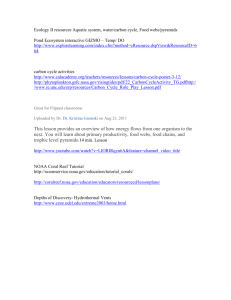
![Eduardo A. Araujo-Pradere [], CIRES, University of Colorado, Solar Minimum](http://s2.studylib.net/store/data/013086460_1-158f16f4991b8d654a2183bbdcda9c6c-300x300.png)
